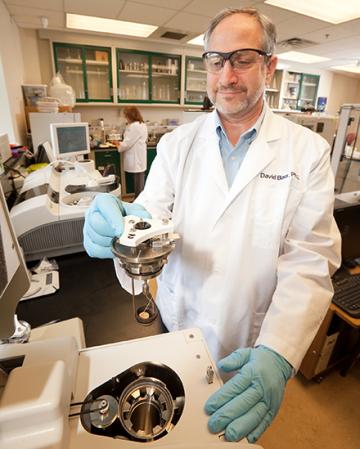Arresting Public Enemy Number One

A key source of vegetable oil in the United States, soybeans (Glycine max) were domesticated in China—possibly as far back as the 11th century B.C.—and are currently the leading provider of protein and oil around the globe. (Scott Bauer. K8324-3)
Fatty Acids and Mortality: ARS Scientists Get to the Heart of the Matter
If you had a chance to avoid the nation’s number one cause of death, would you be interested? Researchers with USDA’s Agricultural Research Service (ARS) are.
The Centers for Disease Control and Prevention (CDC) estimates that one person dies every 36 seconds in the United States from cardiovascular disease. That’s about 25% of America’s mortality rate. Heart disease costs the United States about $363 billion each year from 2016 to 2017 – almost $1 billion per day.
“Poor diets contribute to risk of many diseases,” said David Baer, supervisory research physiologist at the ARS Food Components and Health Laboratory, in Beltsville, MD. “We are interested in how different foods and dietary patterns can improve health.”
Baer and his colleagues have led volunteer test subjects in two dietary projects to determine the effects of fatty acids on heart health. Specifically, consumption of lean beef in a Mediterranean diet and cooking with high-oleic soybean oil.

Baked goods and snacks can be made with high oleic soybean oils and shortenings. (Stephen Ausmus, D3066-1)
The high-oleic soybean oil study tested performance in frying and baking as a heart-health alternative to other oils. Compared to them, tests showed that high-oleic soybean oils and blends of high-oleic soybean oil can reduce risk factors for heart disease.
Baer’s other project showed that replacing some of the protein traditionally found in a Mediterranean diet with lean beef actually minimizes some factors of heart disease.
Both were highly controlled dietary intervention studies: High-oleic soybean oil was performed at the ARS Human Nutrition Research Center (BHNRC) in Beltsville, and the lean beef study was conducted at both BHNRC and Penn State University.
Volunteers ate only foods prepared by research staff. After a predetermined time, they then provided biospecimens (blood, urine, feces) to measure compounds associated with heart disease risk, such as LDL – bad cholesterol.

ARS physiologist David Baer analyzes diet study samples in the laboratory. (Stephen Ausmus, D2946-3)
Baer’s study targeted these two subjects because of their popularity.
“Food needs to taste good!” he said. “We all have our individual preferences, and we need to find ways to incorporate healthy foods into our diet to improve our health.”
Americans can fill their cravings for different foods by using high-oleic soybean oil. Because it has a lower amount of the fatty acids that are less shelf-stable, like polyunsaturated fatty acids, it does not need to be partially hydrogenated, which results in trans-fatty acids. Further, high oleic soybean oil can be fully hydrogenated, resulting in a fatty acid that does not impact LDL-cholesterol and blends with other oils. These fat blends provide the functionality for things like baking without the harmful health effects of partially hydrogenated oils.
The Mediterranean type diet in this study was consistent with U.S. dietary guidelines for dietary saturated fatty acids and sodium. The meals included various sized protein portions from lean beef with the remainder being fish, poultry, pork, nuts, eggs, and legumes. The diets included olive oil as the predominant fat and provided 3-6 servings of fruit daily and at least 6 servings of vegetables daily.
“Diet matters and if we choose foods or dietary patterns that are heart healthy, we can reduce our risk for heart disease,” Baer said “There are alternatives to traditional foods that are tasty, well-liked, and heart-healthier. Developing new foods do lead to improvements in our diets and our health. Whether it’s a new use for soybean oil or a new cut of beef that is leaner, there are options.” – By Scott Elliott, ARS Office of Communications

